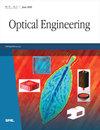利用随机相位编码进行长波红外无透镜物体分类
IF 1.2
4区 工程技术
Q4 OPTICS
引用次数: 0
摘要
我们介绍了一种利用双随机相位编码的无透镜长波红外(LWIR)传感系统。采用薄型随机相位编码元件后,就不再需要传统的光学透镜。在进行物体分类时,使用卷积神经网络处理随机相位编码产生的斑点模式,从而避免了与无镜头成像相关的重建问题。这种方法对要求紧凑和低成本的低红外系统应用很有吸引力。我们提供了实验来说明所提议的系统。我们的结果表明,在噪声条件下的二元分类任务中,该系统与传统的透镜式长波红外成像方法相比具有很强的竞争力。据我们所知,这是第一份关于长波红外领域此类方法的报告。本文章由计算机程序翻译,如有差异,请以英文原文为准。
Lensless object classification in long wave infrared using random phase encoding
We introduce a lensless long wave infrared (LWIR) sensing system, utilizing double-random phase encoding. The employment of thin random phase encoding elements eliminates the need for traditional optical lenses. For object classification, convolutional neural network is used to process the speckle patterns produced by the random phase encoding, thus avoiding the reconstruction problem associated with lensless imaging. This approach is attractive for applications demanding compactness and cost-efficiency for LWIR systems. Experiments are provided to illustrate the proposed system. Our results demonstrate that this system competes well with conventional lensed LWIR imaging methods in a binary classification task under noisy conditions, where noise is not known a priori. To the best of our knowledge, this is the first report on such approaches in the LWIR domain.
求助全文
通过发布文献求助,成功后即可免费获取论文全文。
去求助
来源期刊

Optical Engineering
工程技术-光学
CiteScore
2.70
自引率
7.70%
发文量
393
审稿时长
2.6 months
期刊介绍:
Optical Engineering publishes peer-reviewed papers reporting on research and development in optical science and engineering and the practical applications of known optical science, engineering, and technology.
 求助内容:
求助内容: 应助结果提醒方式:
应助结果提醒方式:


